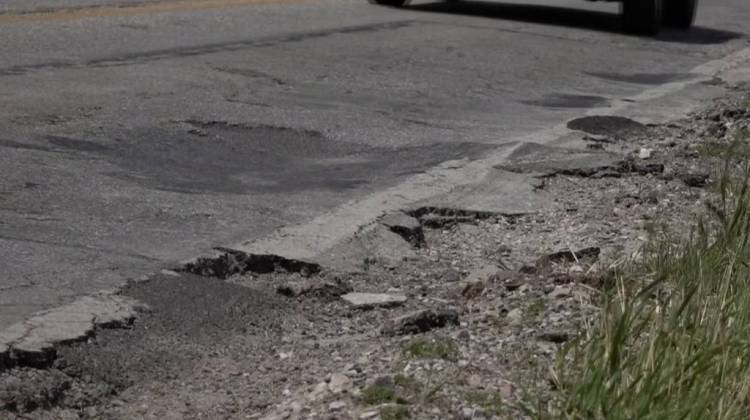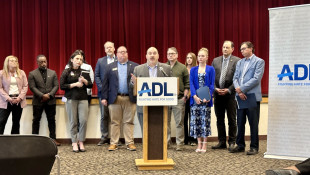Patrick Sadlowski remembers his first drink. It was as a 7-year-old at his first communion.
"I was like, I can drink this. YES!," said Sadlowski. "A 7-year-old shouldn't be having those thoughts."
That’s how it started. Sadlowski went to mass every Sunday to taste the wine and then began drinking here and there at family functions.
As he grew older, Patrick was curious about other substances; and when he was 14, he smoked marijuana for the first time.
"There was no 'Oh, I'm only going to do this on the weekends or once a month'," he said. "This was 'I am going to do this every, single day' and I knew that was not a good idea, but with that knowledge, I just could not stop."
After his sister broke up with her boyfriend, Sadlowski had trouble getting weed, so he turned to prescription pills, instead.
And, one day, even tried to sell drugs at a fish fry which ended up getting him expelled from school. He says that was the wakeup call he needed.
"So then after that I started realizing like, you know what, I want a better life for myself. I don't want to go back to how I felt when I was getting high," said Sadlowski. "I knew that by doing drugs I wasn't going to be happy and I wasn't going to grow as a person."
Sadlowski committed to staying sober, and did, but the peer pressure to use during his first two years of high school was overwhelming.
So, he decided to enroll at Hope Academy on the city’s northside.
"It's a specialty school for kids who want to stay clean and sober and can give them the tools and the help in order to make that happen," said Hope Academy COO, Rachelle Gardner.
Hope opened in 2006 as a tuition free, charter public high school for kids dealing with addiction to drugs and alcohol.
Gardner is quick to point out that it’s not a rehabilitation center, but a school that is more suitable for those dealing with addiction.
Class sizes are of about 15 students who get drug tested roughly twice a month. They also are required to go through a 12 step meetings and have a sponsor.
Gardner says having more personal attention is key in the learning process and in managing their battle with drugs.
"The teachers understand what they are going through. They have somebody here that can support them at any given point around an issue," said Gardner. "A lot of our kids have emotional issues, as well - anxiety, depression, ADD - and we are able to continue to teach them even though those issues are arising and be able to work through those issues with them."
And when they get that attention, Gardner says their performance in and out of the classroom improves.
She says math and reading tests scores go up about five or six points when a student stays sober.
Kennedy Honeycutt, 17, is in her first semester at Hope. She used to smoke pot recreationally, but struggled with alcohol addiction.
Even though she is relatively new to the Academy, she can already see herself transforming.
"I'm getting good grades now. I haven't gotten good grades for a long, long time," said Kennedy. "I'm on track to graduate. I might even graduate early. I'm going to be a senior next year. Just overall, my attitude has changed."
Kennedy had one relapse during the school’s spring break, but says the relationships she’s built at Hope helped her get back on the path of sobriety.
"I felt bad because it was more of disappointing people that I've gained trust with," she said. "All of those days that I was working for were gone, so I felt like crap about it."
"There is nothing I really did intentionally, but have that motivation to keep going, to make people proud," she said.
Now, she is 130 days sober and wants to pursue a career as a counselor.
Since it opened, 50 students have graduated from Hope and all, but one, have gone on to higher education.
Some students leave before graduating, opting instead to return to their previous high schools, but Gardener says they do so with the tools to deal with the pressures of drugs and alcohol.
"I think we touch every kid's life who comes through here in some way" she said. "We've had over 250 kids come through the school and I think we have impacted them in some manner."
"Have then all stayed clean and sober? Probably not, but they have felt the support, they need. They know where they can come get it. So, I think just having the school creates success."
Sadlowski is one of those success stories.
The now 20-year-old, who took his first drink before middle school, graduated from Hope last year.
He now has a steady job and is preparing for college in the fall where he also plans to study to become a counselor.
In May, Sadlowski returned to Hope to speak at graduation.
"Not all of this has been easy, however it is possible. Without Hope Academy, my family, and the rest of my recovery support network, I don't believe I would have survived my darkest time," he told the graduates. "I know what it's like to struggle and feel like you don't have the strength to continue anything. If you ever have those thoughts or feelings, please know that everyone at Hope, including myself, will be here for you if you need it."
And for a young man who once used drugs to escape, the future is full of hope.
Photo courtesy hopeacademyrhs.org
 DONATE
DONATE








 View More Articles
View More Articles



 Support WFYI. We can't do it without you.
Support WFYI. We can't do it without you.